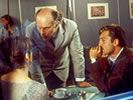Eye For Film >> Movies >> The Dancer Upstairs (2002) Film Review
Inside this jumble of a movie an interesting idea is struggling to stay alive. The blame lies with John Malkovich, in his new role as director. He has no concept of structure, which is surprising for a man who learnt his craft in the theatre.
It takes a long time to come to grips with what is going on. A smart lawyer, called Rejas (Javier Bardem), quits the legal profession, because he believes in justice, and joins the police, as if that will be any better. This is South America, where presidents are kept in power by the verocity of their standing armies.

Men in uniform start being assassinated. Minor politicians, too. Dogs are strung up on lamp posts with dynamite stuffed down their throats. The name Ezequiel keeps appearing next to the word revolution. Rejas is put in charge of a hand-picked group of undercover agents to find this person before the whole country goes up in flames.
Rejas is an enigmatic character. You don't know what he's thinking, or why he's so bad at his job. Bardem plays him like a chef who put too many magic mushrooms in the omelette. His eyes are at half mast and he looks bemused in a photogenic kind of way.
Instead of staying with politics and violence, Rejas's private life is pushed to the fore. His glamorous wife appears vain and vapid. Their daughter goes to ballet class, run by an ex-dancer, called Yolanda (Laura Morante). Rejas finds himself drawn to her, but takes forever making a move, not that anything can come of it, of course.
Is this an illicit romance, a political thriller, or the story of an honest cop in a corrupt country? Malkovich cannot decide and so tries a bit of everything. The photography may be intentionally rough, to avoid comparison with Tony Scott, but poor lighting is no substitute for clear imagery.
Everyone speaks English, with accents, even the peasants, except sometimes they don't. Either you go for subtitles, or an alien tongue. Here, they do both. Also, those in authority, especially the chief of police, are stereotypes. Bardem sleepwalks through the middle section before Morante wakes him up, but, by then, it's too late. At least, she feels like a real person, with desires and choices. He's a hunk of cheese, burbling script waste, such as, "If you draw a map of where you have ever been, you draw your own face."
Reviewed on: 05 Dec 2002






















